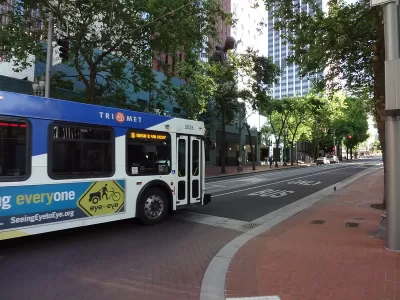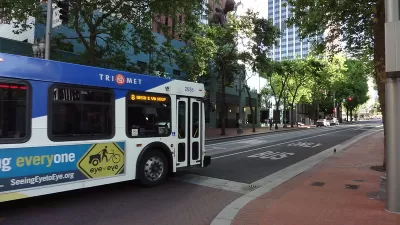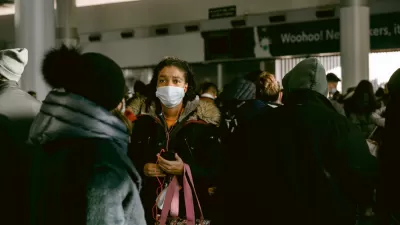Like many transit agencies around the country, the regional transit agency for Portland, Oregon is struggling to attract enough bus drivers to maintain planned levels of transit service.

The Tri-County Metropolitan Transportation District of Oregon (TriMet), the transit agency for the Portland region, is temporarily reducing transit service on ten bus lines due to an ongoing shortage of operators, according to an article by Tyler Graf posted on the TriMet website on June 22.
TriMet is dealing with the largest operator shortage in the agency’s history, mirroring the ongoing bus driver shortage around the country. While some transit agencies were challenged by driver shortages previous to the Covid-19 pandemic, the issue has since become almost ubiquitous, leading to service reductions like those in Portland in addition to the scaling back of planned bus system redesigns, like in Los Angeles and in Miami.
Among the actions TriMet has undertaken to reverse the driver shortage, the article has boosted starting pay (to $25.24 an hour) and signing bonuses (to $7,500).
“With the COVID-19 pandemic changing the way people travel, TriMet has launched Forward Together, a comprehensive service analysis and community engagement effort to determine a better bus system,” according to the article.
FULL STORY: TriMet to temporarily reduce service levels this fall due to historic operator shortage

Maui's Vacation Rental Debate Turns Ugly
Verbal attacks, misinformation campaigns and fistfights plague a high-stakes debate to convert thousands of vacation rentals into long-term housing.

Planetizen Federal Action Tracker
A weekly monitor of how Trump’s orders and actions are impacting planners and planning in America.

San Francisco Suspends Traffic Calming Amidst Record Deaths
Citing “a challenging fiscal landscape,” the city will cease the program on the heels of 42 traffic deaths, including 24 pedestrians.

Defunct Pittsburgh Power Plant to Become Residential Tower
A decommissioned steam heat plant will be redeveloped into almost 100 affordable housing units.

Trump Prompts Restructuring of Transportation Research Board in “Unprecedented Overreach”
The TRB has eliminated more than half of its committees including those focused on climate, equity, and cities.

Amtrak Rolls Out New Orleans to Alabama “Mardi Gras” Train
The new service will operate morning and evening departures between Mobile and New Orleans.
Urban Design for Planners 1: Software Tools
This six-course series explores essential urban design concepts using open source software and equips planners with the tools they need to participate fully in the urban design process.
Planning for Universal Design
Learn the tools for implementing Universal Design in planning regulations.
Heyer Gruel & Associates PA
JM Goldson LLC
Custer County Colorado
City of Camden Redevelopment Agency
City of Astoria
Transportation Research & Education Center (TREC) at Portland State University
Jefferson Parish Government
Camden Redevelopment Agency
City of Claremont





























